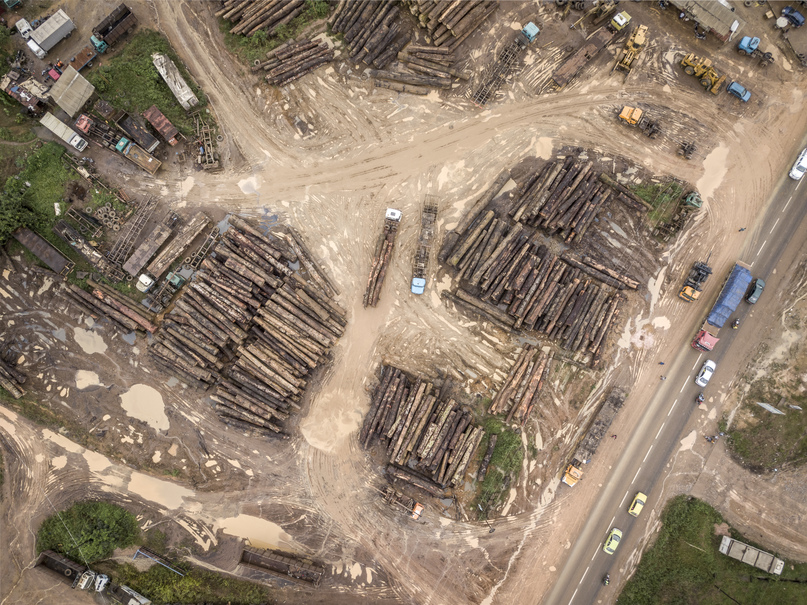Sustainable supply chains

Aerial view of a log depot near Douala, Cameroon—one of the links in a tropical timber supply chain. Through its projects and activities, ITTO works with its members to implement best practices at every link in the chain. Photo: A. Walmsley/TRAFFIC
A supply chain comprises the organizations, activities and processes associated with all stages of the business processes involved in planning, sourcing, processing, manufacturing and delivering goods and services. A sustainable supply chain is one that minimizes negative environmental and social impacts, addressing issues such as water and energy use, pollution, the treatment of workers, biosecurity, marginalized people, biodiversity and land use.
Sustainable timber supply chains ensure efficiency, best practices and transparency at every “link” in the chain—in the forest, on the log truck, in the mill, on the ship and in the showroom. Sustainable timber supply chains enable purchasers in domestic and international markets to become drivers of sustainable forest management (SFM) and legal compliance in tropical timber-producing countries by increasing demand for legal and sustainable forest products, thereby creating a virtuous cycle.
Sustainable tropical timber supply chains bring benefits to all stakeholders, from forest owners in the tropics to consumers of the final products—as well as to the global environment. Businesses might want to implement sustainable supply chains because they are good corporate citizens but also as a means for reducing costs and increasing efficiency. The concept of sustainable tropical timber supply chains captures many of the elements of sustainability that ITTO has been promoting since its inception. At its most fundamental, it requires that timber is harvested and traded legally.
The tropical forest sector has immense potential to contribute to the sustainable global supply of goods and services. ITTO’s mandate is to promote the expansion and diversification of international trade in tropical timber from sustainably managed and legally harvested forests. It will, therefore, continue championing sustainability—the crucial ingredient in the long-term health and vitality of the tropical forest sector.
Sustainable timber supply chains ensure efficiency, best practices and transparency at every “link” in the chain—in the forest, on the log truck, in the mill, on the ship and in the showroom. Sustainable timber supply chains enable purchasers in domestic and international markets to become drivers of sustainable forest management (SFM) and legal compliance in tropical timber-producing countries by increasing demand for legal and sustainable forest products, thereby creating a virtuous cycle.
Sustainable tropical timber supply chains bring benefits to all stakeholders, from forest owners in the tropics to consumers of the final products—as well as to the global environment. Businesses might want to implement sustainable supply chains because they are good corporate citizens but also as a means for reducing costs and increasing efficiency. The concept of sustainable tropical timber supply chains captures many of the elements of sustainability that ITTO has been promoting since its inception. At its most fundamental, it requires that timber is harvested and traded legally.
The tropical forest sector has immense potential to contribute to the sustainable global supply of goods and services. ITTO’s mandate is to promote the expansion and diversification of international trade in tropical timber from sustainably managed and legally harvested forests. It will, therefore, continue championing sustainability—the crucial ingredient in the long-term health and vitality of the tropical forest sector.
Related links
- See the news story, International forum creates network to encourage global green timber supply chains
-
Watch the video "Traceability system improves forest governance in Panama"
(released in 2019)
- See International Workshop on Global Green Supply Chain of Forest Products and Dialogue with Chinese Leading Forest Products Enterprises which took place in June 2018
- See International Symposium on the Promotion of Deforestation-Free Global Supply Chains for Contributing to Halt Deforestation
-
See special edition of the Tropical Forest Update, “The Buzz on Green Supply Chains”
(published in 2018)
- See the news story, Productive forests, sustainable supply chains key to achieving sustainable development targets, says Dieterle
- See Sustainable Wood for a Sustainable World
- Download the report of the international conference Working Across Sectors to Halt Deforestation and Increase Forest Area—From Aspiration To Action
-
Watch the video The challenges of achieving deforestation-free supply chains and how to overcome them
(released in 2018)
-
Watch the interview Hin Keong Chen, TRAFFIC International, speaks on green supply chains
(released in 2017)
- Watch the interview Promoting tropical forestry investments, legality and green supply chains
- Watch the ITTO Annual Market Discussion 2017, promoting investments in tropical timber industries
- See ongoing supply-chain-related projects
- See completed supply-chain-related projects